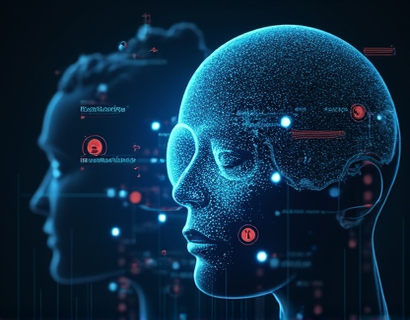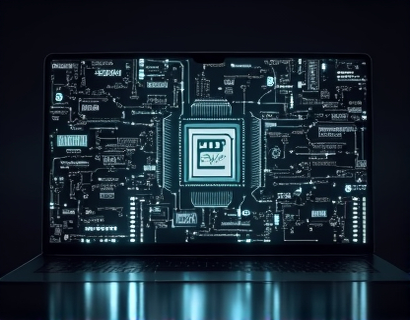AI and Crypto: Transforming Digital Engagement with Advanced Ecosystem Solutions
The intersection of artificial intelligence (AI) and cryptocurrency is ushering in a new era of digital engagement, where businesses can leverage advanced technologies to create more interactive, secure, and personalized user experiences. This transformation is not just about integrating two cutting-edge fields but about redefining how digital ecosystems operate and how users interact within them. For tech professionals and enthusiasts, understanding this synergy is crucial for staying ahead in a rapidly evolving tech landscape.
The integration of AI and cryptocurrency is multifaceted, impacting various aspects of digital ecosystems, from user authentication and data security to personalized content delivery and decentralized applications. This article delves into the ways AI and crypto are reshaping user engagement, offering businesses sophisticated strategies and AI-driven insights to enhance interactions, drive growth, and innovate in the tech sphere.
Enhancing User Authentication and Security
One of the most significant impacts of AI and crypto on digital engagement is in the realm of user authentication and security. Traditional methods such as passwords are increasingly vulnerable to breaches and hacking attempts. Blockchain technology, the backbone of cryptocurrency, offers a decentralized and secure alternative. By leveraging blockchain, businesses can implement more robust authentication mechanisms, ensuring that user data is protected and transactions are secure.
AI plays a pivotal role in this process by enhancing the security protocols further. Machine learning algorithms can detect anomalies and potential threats in real-time, providing a dynamic layer of security that adapts to new threats. For instance, AI-driven systems can analyze user behavior patterns to identify and prevent unauthorized access. This combination of AI and blockchain not only enhances security but also builds user trust, a critical factor in digital engagement.
Personalized User Experiences
Personalization is key to driving user engagement in the digital age. AI algorithms excel at analyzing vast amounts of data to understand user preferences and behaviors, enabling businesses to deliver tailored content and services. When combined with cryptocurrency, this personalization can be taken to new heights through decentralized and transparent data management.
Cryptocurrency-based tokens can be used to reward users for engaging with specific content or services, creating a gamified experience that encourages more interaction. For example, a platform could issue tokens that users earn by completing tasks or participating in community discussions. These tokens can then be redeemed for premium content or services, fostering a more engaged and active user base. AI can optimize this process by predicting which content or rewards will be most appealing to individual users, further enhancing the personalization.
Decentralized Applications and Smart Contracts
Decentralized applications (dApps) powered by blockchain technology are revolutionizing the way users interact with digital services. Unlike traditional applications, dApps operate on a decentralized network, eliminating the need for intermediaries and central authorities. This decentralization not only enhances security but also promotes transparency and user control.
Smart contracts, self-executing contracts with the terms directly written into code, are a cornerstone of dApps. AI can enhance the functionality of smart contracts by providing predictive analytics and automated decision-making. For instance, AI can analyze market trends and user behavior to dynamically adjust the terms of a smart contract, ensuring optimal outcomes for all parties involved. This synergy between AI and smart contracts creates more efficient and trustworthy digital interactions.
Fraud Detection and Prevention
Fraud remains a significant challenge in digital ecosystems, affecting user trust and business operations. AI-driven fraud detection systems can analyze transaction patterns and user behavior to identify suspicious activities in real-time. By integrating blockchain, these systems gain an additional layer of security, as every transaction is recorded on an immutable ledger.
Machine learning models can be trained to recognize fraudulent patterns and flag them for review. This proactive approach not only protects users but also reduces the financial and reputational risks for businesses. The transparency of blockchain ensures that all transactions are verifiable, further enhancing trust and engagement within the digital ecosystem.
Enhanced Data Analytics and Insights
Data analytics is a critical component of digital engagement, providing businesses with valuable insights into user behavior and preferences. AI algorithms can process and analyze large datasets to uncover patterns and trends that might go unnoticed by human analysts. When combined with blockchain, these insights become even more powerful, as the data is secure and tamper-proof.
AI-driven analytics can help businesses understand the impact of their digital strategies, optimize content delivery, and identify new opportunities for growth. For example, by analyzing user interactions with cryptocurrency-based rewards, a platform can refine its engagement tactics to better meet user needs. This data-driven approach ensures that businesses can adapt quickly to changing user preferences and market conditions.
Community Building and Decentralized Governance
Building a strong community is essential for the success of any digital ecosystem. AI and cryptocurrency can facilitate this process by enabling decentralized governance models. Token-based voting systems, powered by smart contracts, allow community members to have a say in decision-making processes. AI can enhance this by analyzing community sentiment and predicting the outcomes of proposed changes, helping to streamline the governance process.
Moreover, AI can foster community engagement through personalized communication and content recommendation systems. By understanding the interests and preferences of community members, platforms can deliver relevant updates and opportunities, keeping users engaged and invested in the ecosystem.
Challenges and Considerations
While the integration of AI and cryptocurrency offers numerous benefits, it also presents challenges that businesses must address. Regulatory compliance is a significant concern, as the crypto space is still navigating a complex landscape of laws and regulations. Ensuring compliance while leveraging the advantages of these technologies requires a deep understanding of both AI and crypto regulations.
Another challenge is the technical complexity involved in integrating these technologies. Businesses need to invest in skilled personnel and robust infrastructure to implement and maintain AI and blockchain solutions effectively. Additionally, user education is crucial, as many users may be unfamiliar with cryptocurrency and blockchain concepts. Providing clear and accessible information can help overcome this barrier and promote wider adoption.
Future Prospects
The future of AI and cryptocurrency in digital engagement is promising, with ongoing advancements likely to unlock even more innovative possibilities. As AI algorithms become more sophisticated, their ability to enhance user experiences and drive business growth will continue to improve. The adoption of decentralized technologies is also expected to grow, driven by a increasing demand for secure and transparent digital solutions.
One exciting area of development is the integration of AI with other emerging technologies such as the Internet of Things (IoT) and augmented reality (AR). These combinations can create immersive and interactive user experiences that were previously unimaginable. For instance, AI-driven IoT devices can provide real-time data that, when analyzed by AI, can offer personalized recommendations through AR interfaces.
In conclusion, the integration of AI and cryptocurrency is transforming digital engagement by enhancing security, personalization, and community building. Businesses that embrace these technologies can gain a competitive edge, driving growth and innovation in the tech landscape. As the field continues to evolve, staying informed and adaptable will be key to success.











































